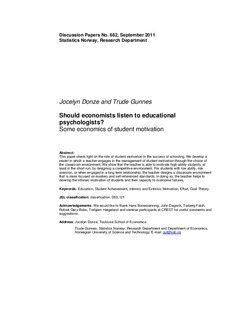Should economists listen to educational psychologists? Some economics of student motivation
| dc.contributor.author | Donze, Jocelyn | |
| dc.contributor.author | Gunnes, Trude | |
| dc.date.accessioned | 2011-10-18T23:36:44Z | |
| dc.date.available | 2011-10-18T23:36:44Z | |
| dc.date.issued | 2011 | |
| dc.identifier.issn | 1892-753x | |
| dc.identifier.uri | http://hdl.handle.net/11250/180343 | |
| dc.description.abstract | Abstract: This paper sheds light on the role of student motivation in the success of schooling. We develop a model in which a teacher engages in the management of student motivation through the choice of the classroom environment. We show that the teacher is able to motivate high-ability students, at least in the short run, by designing a competitive environment. For students with low ability, risk aversion, or when engaged in a long term relationship, the teacher designs a classroom environment that is more focused on mastery and self-referenced standards. In doing so, the teacher helps to develop the intrinsic motivation of students and their capacity to overcome failures. __________________ Keywords: Education, Student Achievement, Intrinsic and Extrinsic Motivation, Effort, Goal Theory. | en_US |
| dc.language.iso | eng | en_US |
| dc.publisher | Statistics Norway | en_US |
| dc.relation.ispartofseries | Discussion Papers;No. 662 | |
| dc.subject | Utdanning | en_US |
| dc.subject | Education | en_US |
| dc.subject | Student achievement | en_US |
| dc.subject | Goal theory | en_US |
| dc.subject | student motivation | en_US |
| dc.subject | Success of schooling | en_US |
| dc.subject | JEL classification: D03 | en_US |
| dc.subject | JEL classification: I21 | en_US |
| dc.title | Should economists listen to educational psychologists? Some economics of student motivation | en_US |
| dc.type | Working paper | en_US |
| dc.subject.nsi | VDP::Social science: 200::Education: 280 | en_US |
| dc.source.pagenumber | 32 s. | en_US |
Tilhørende fil(er)
Denne innførselen finnes i følgende samling(er)
-
Discussion Papers [1003]
